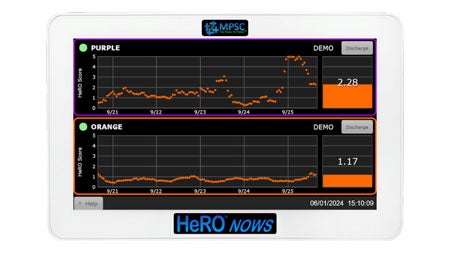
Principle Investigator Brynne Sullivan, MD
What is NOWS
Neonatal Opioid Withdrawal Syndrome (NOWS), also known as Neonatal Abstinence Syndrome (NAS), affects newborns exposed to opioids in utero, leading to withdrawal symptoms such as tremors, irritability, poor feeding, respiratory distress, and seizures after birth. Addressing NOWS is critical, as early and effective treatment can significantly improve the health and developmental outcomes of these vulnerable infants, reducing the long-term impact on their growth, neurological function, and overall quality of life. As the rate of maternal opioid use disorder continues to rise in the United States, an increasing number of infants are affected by NOWS. Current standard assessment of NOWS relies on subjective scoring systems such as the Finnegan neonatal abstinence scoring system (FNASS) and Eat, Sleep, Console (ESC), which can lead to significant variability in diagnosis and treatment.
Research Team
To address this issue, the researchers at University of Virginia , University of Alabama at Birmingham and Washington University in St. Louis in collaboration with Medical Predictive Science Corporation, are excited to announce early phase development of “HeRO NOWS,” an innovative device aimed at optimizing and validating technology for objective NOWS assessment based on physiologic data. This initiative is supported by an NIH HEAL R18 Award (R18 EB035019) and recently received the FDA breakthrough device designation to facilitate faster development, assessment, and potential premarket submission, bringing this crucial device to the market more swiftly.
FDA’s Breakthrough Device Program
The Breakthrough Device designation is granted to medical devices that have the potential to provide more effective treatment or diagnosis of life-threatening or irreversibly debilitating diseases or conditions. It enables accelerated development, assessment, and review of the device, ensuring timely access to vital innovations in healthcare. This recognition highlights the potential impact of ‘HeRO NOWS’ in improving the standard of care for newborns affected by opioid withdrawal.
What is HeRO NOWS
HeRO NOWS is intended to acquire, store, analyze, and report on pulse oximetry data collected from infants in critical care settings, including hospital newborn nurseries, intermediate care units, and neonatal intensive care units or NICUs. HeRO NOWS will analyze pulse or heart rate variability and oxygen saturation levels, which contain markers of autonomic hyperexcitability caused by opioid withdrawal. Used under the direct supervision of licensed healthcare practitioners, HeRO NOWS will aid decisions on treatment of neonates with opioid withdrawal.
About MPSC
Medical Predictive Science Corporation (MPSC) is committed in the development of computational diagnostic and bioinformatic technologies for the healthcare industry. MPSC is committed to saving lives and reducing healthcare expenditures through the development of effective clinical diagnostic and decision support tools. These products use computational diagnostic methods to make the early diagnosis of clinical illness through continuous, non-invasive patient monitoring, and to provide diagnostic information as well as decision support to the physician.
By leveraging widely available technology like pulse oximetry, HeRO NOWS could provide a consistent and reliable tool for healthcare providers to better manage the care of withdrawing infants.
For more information on this study or this device, contact UVA study team: Principal Investigator Brynne Sullivan, MD or Angela Gummadi.
Filed Under: Research

